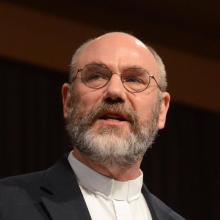
I'd taken a break from reading other people's blogs, but when I had a look to see what I'd been missing I found a superb 4-part essay by Peter Leithart on the subject of paedocommunion - the admission of baptised children to the Lord's Table.
Part 1: This question is intricately related to lots of other questions. In particular, the way we celebrate Holy Communion, and who we admit to it, says something about the gospel you believe. So, explicit teaching aside, what does the way you do / do not admit children to the Lord's Supper say about the gospel?
Part 2: The Christian church is the new Israel. Yet, if we do not admit children to Communion, by that very exclusion we are saying that we are not Israel.
Part 3: The Christian church is not only the new Israel, it is also the new humanity; Jesus is not only a new Abraham, but he is also a new Adam. Yet, if we do not admit children to Communion, by that very exclusion we are saying that the Christian church is not God's new humanity.
That, however begs a question. Might it not be the case that the Christian church is the new humanity, but only some true members of the church eat and drink at the Lord's Supper? In other words, could participation in the Supper be accidential, not essential, to being a member of the Christian church? If not, the argument in part 3 unravels.
Part 4: Inclusion in the sacraments is a necessary privilege of membership in the covenant people.
Now, there's one part of his argument that I need to give further thought to. It comes in his part 3, where he sets up a hypothetical situation where you suddenly knew that every human being was eternally elect. Would you, then, admit them all to Baptism and the Lord's Supper? However, we baptise adults at the moment they profess faith in Christ; for a long time before that, they were eternally elect but not a part of the visible church. So there may be some external response from them that is necessary before we admit them to the visible sacraments. I need to think through how the sacrament relate to the visible and the universal church, and I also need to look again at Leithart's argument because I may be agreeing with enough of his point for the consequences to follow.
My latent questions to one side, it's a helpful series of essays he's written, so I commend them to you, my readers. And, as this blog is also a kind of personal commonplace book where I note things I may wish to return to, I'm also posting this here for my own future reference.
Recent comments